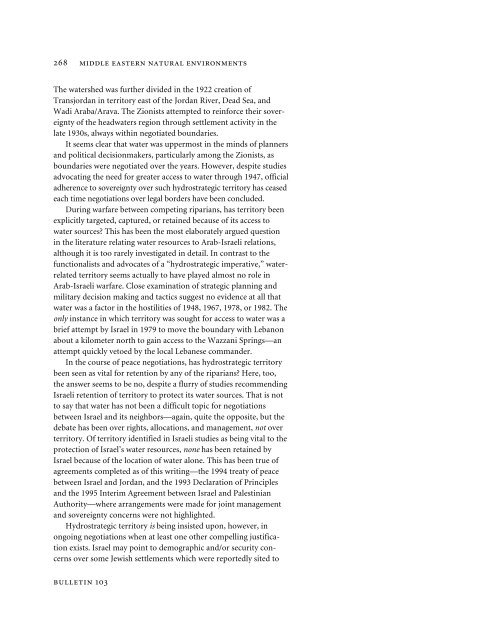Hydrostrategic Decisionmaking and the Arab ... - Yale University
Hydrostrategic Decisionmaking and the Arab ... - Yale University
Hydrostrategic Decisionmaking and the Arab ... - Yale University
You also want an ePaper? Increase the reach of your titles
YUMPU automatically turns print PDFs into web optimized ePapers that Google loves.
268 MIDDLE EASTERN NATURAL ENVIRONMENTSThe watershed was fur<strong>the</strong>r divided in <strong>the</strong> 1922 creation ofTransjordan in territory east of <strong>the</strong> Jordan River, Dead Sea, <strong>and</strong>Wadi <strong>Arab</strong>a/Arava. The Zionists attempted to reinforce <strong>the</strong>ir sovereigntyof <strong>the</strong> headwaters region through settlement activity in <strong>the</strong>late 1930s, always within negotiated boundaries.It seems clear that water was uppermost in <strong>the</strong> minds of planners<strong>and</strong> political decisionmakers, particularly among <strong>the</strong> Zionists, asboundaries were negotiated over <strong>the</strong> years. However, despite studiesadvocating <strong>the</strong> need for greater access to water through 1947, officialadherence to sovereignty over such hydrostrategic territory has ceasedeach time negotiations over legal borders have been concluded.During warfare between competing riparians, has territory beenexplicitly targeted, captured, or retained because of its access towater sources? This has been <strong>the</strong> most elaborately argued questionin <strong>the</strong> literature relating water resources to <strong>Arab</strong>-Israeli relations,although it is too rarely investigated in detail. In contrast to <strong>the</strong>functionalists <strong>and</strong> advocates of a “hydrostrategic imperative,” waterrelatedterritory seems actually to have played almost no role in<strong>Arab</strong>-Israeli warfare. Close examination of strategic planning <strong>and</strong>military decision making <strong>and</strong> tactics suggest no evidence at all thatwater was a factor in <strong>the</strong> hostilities of 1948, 1967, 1978, or 1982. Theonly instance in which territory was sought for access to water was abrief attempt by Israel in 1979 to move <strong>the</strong> boundary with Lebanonabout a kilometer north to gain access to <strong>the</strong> Wazzani Springs—anattempt quickly vetoed by <strong>the</strong> local Lebanese comm<strong>and</strong>er.In <strong>the</strong> course of peace negotiations, has hydrostrategic territorybeen seen as vital for retention by any of <strong>the</strong> riparians? Here, too,<strong>the</strong> answer seems to be no, despite a flurry of studies recommendingIsraeli retention of territory to protect its water sources. That is notto say that water has not been a difficult topic for negotiationsbetween Israel <strong>and</strong> its neighbors—again, quite <strong>the</strong> opposite, but <strong>the</strong>debate has been over rights, allocations, <strong>and</strong> management, not overterritory. Of territory identified in Israeli studies as being vital to <strong>the</strong>protection of Israel’s water resources, none has been retained byIsrael because of <strong>the</strong> location of water alone. This has been true ofagreements completed as of this writing—<strong>the</strong> 1994 treaty of peacebetween Israel <strong>and</strong> Jordan, <strong>and</strong> <strong>the</strong> 1993 Declaration of Principles<strong>and</strong> <strong>the</strong> 1995 Interim Agreement between Israel <strong>and</strong> PalestinianAuthority—where arrangements were made for joint management<strong>and</strong> sovereignty concerns were not highlighted.<strong>Hydrostrategic</strong> territory is being insisted upon, however, inongoing negotiations when at least one o<strong>the</strong>r compelling justificationexists. Israel may point to demographic <strong>and</strong>/or security concernsover some Jewish settlements which were reportedly sited toBULLETIN 103
















